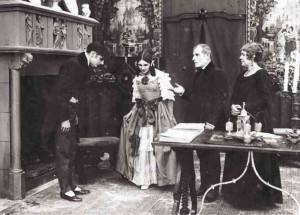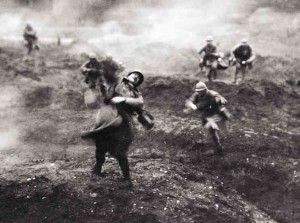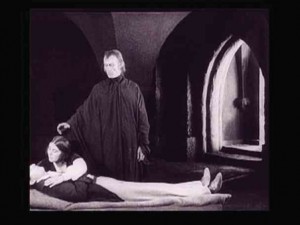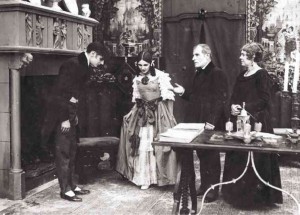Across cultures, beyond language
The irony is not lost on Carlos Madrid, director of Instituto Cervantes in Manila.
He acknowledges that it seems perplexing that Instituto Cervantes, an institution dedicated to the promotion of the Spanish language, is an active participant in the 8th International Silent Film Festival, which will be held at Shangri-La Plaza, starting tomorrow until Aug. 31.
“Silent movies transcend language,” Madrid explains. “This unique event brings classic movies and contemporary musicians together.”
The fest showcases silent movies with live scoring by various local artists.
Spain’s entry this year, Jose Buch’s “Curro Vargas,” will be accompanied by blues and jazz band Glass Cherry Breakers, with Maegan Aguilar on vocals.
Madrid thinks the band, led by guitarist Sammy Asuncion, is a perfect fit for the 1923 film that’s based on a zarzuela.
Article continues after this advertisement“There are so many elements in the Spanish film—costumes, dances, music—that are familiar to us Filipinos,” says Asuncion. “The band will improvise and ‘feel’ the music during the screening (Aug. 31, 5 p.m.).”
Article continues after this advertisementDiva film
Emanuela Adesini, cultural attaché of the Italian embassy, relates that her country’s entry presents an experimental combination. Mario Caserini’s “diva” film “Ma L’Amor Mio Non Muore (Love Everlasting)” will be scored by deejay Caliph8 (Arvin Nogueras with Fred Sandoval and Malek Lopez) and soprano Fame Flores.
“Since it was the screen debut of famous stage actress Lyda Borelli, this 1913 film bridges cinema and theater,” Adesini remarks. “On the other hand, Arvin and Fame’s collaboration bridges modern music and opera.”
Flores and Nogueras are excited about the unlikely pairing.
Says Flores: “It’s my first time to work with contemporary musicians. The movements of the actress in the film are exaggerated. Music, in a way, will neutralize the theatricality.”
Nogueras, for his part, insists that his playlist is not limited to hip-hop and techno. “I’m into old film composers—from Leopoldo Silos to Ennio Morricone. All these ideas will be merged in our performance (Aug. 30, 5 p.m.).”
Little Tramp
Kristin L. Kneedler, cultural affairs officer of the United States embassy, tells the Inquirer that Charlie Chaplin’s “City Lights” was chosen to commemorate the centennial of the remarkable 75-year film career of the Little Tramp (as Chaplin was lovingly nicknamed).
Chaplin made his screen debut in Keystone Studios’ “Making a Living” in 1914.
“‘City Lights’ is his most critically acclaimed film and one of his biggest achievements as writer, director, editor and composer,” Kneedler says.
Interestingly, the 1931 film was released after the advent of sound, and yet it was a box-office smash during the Depression era.
The ensemble Radioactive Sago Project, fronted by Lourd de Veyra, will score the Chaplin classic. Adds Kneedler: “The band’s unpredictable style, mixed with wit and irony, blends well with Chaplin’s humor and unmistakable talent.”
She asserts: “Films, like ambassadors, cross the barriers of language and culture.”
Bassist Francis de Veyra concedes that it is “difficult to tamper with the music composed by Chaplin.” He promises a “double thrill … a visual and aural feast … cacophonous symphony” during the group’s gig (tomorrow, 8 p.m.).
France’s entry, Leon Poirer’s “Verdun: Visions d’Histoire,” likewise commemorates a milestone: the centennial of World War I, which began in 1914 and ended in 1918.
Martin Macalintal, audiovisual attaché of the French embassy, notes, “Poirer’s 1928 film was made 10 years after the Armistice (that ended World War I).”
“This historical-documentary film is a reenactment of the Battle of Verdun—with real soldiers in the cast,” Macalintal says.
The antiwar film was restored by the Cinematheque of Toulouse and is currently being toured around the world—with classical pianist Hakim Bentchoula-Golobitch providing live score in all performances, including Manila (Aug. 29, 7:30 p.m.).
Three stories
Germany’s entry, “Der Müde Tod (Destiny),” was directed by another silent-era master, Fritz Lang.
“The 1921 film features three stories. As such, we thought of bringing together German composer Pierre Oser, ethnomusicologist Jonas Baes and the Manila Composers Lab,” says Petra Raymond, director of Goethe Institut.
Baes admits that scoring a silent film allows both the audience and the artists to embark on a space-time adventure. The German film pushes the journey further, Baes says, because it is set in three different places—China, Persia and Venice.
“The music should reflect the changes in the setting,” Baes points out. “The music will create the environment.”
Baes says it’s as if the musicians will “conduct a dialogue with the film” during the screening (Aug. 29, 5 p.m.).
Asia is represented by Japan and the Philippines this year.
Japan’s entry, Daisuke Ito’s “Chuji Tabi Nikki (A Diary of Chuji’s Travels),” is considered a “masterpiece” for introducing several innovations, reports Shuji Takatori, director of Japan Foundation.
Samurai epic
“It’s a traditional samurai epic, but the director changed the storytelling style, specifically with the use of the montage and populist ideas,” Takatori says.
The three-part film was initially lost, until the second and third parts were found in 1991, he recounts. “The 1927 film was restored and digitized by the National Film Center of the National Museum of Modern Art in Tokyo.”
Japan Foundation picked Kaapin, “unconventional, unorthodox electronic” musicians from Cagayan de Oro to score the film. “We want to engage artists from the different regions,” says Takatori.
Kaapin’s Rotsanjani Mojica recalls that he initially wanted to compose an original score for the silent movie. “But I realized it would defeat the fest’s goals of experimentation and risk-taking.”
He says Kaapin’s score will be “unplanned” during the screening (Aug. 30, 7:30 p.m.).
The Philippine entry is relatively new, Arnel Mardoquio’s 2013 film “Ang Tigmo sa Akong Pagpauli (Riddles of My Homecoming).”
Ted Granados, executive director of the Film Development Council of the Philippines (FDCP), relates that most, if not all, of the country’s silent films were destroyed during World War II and the few movies that survived the conflict were eventually lost due to years of neglect.
Dream-like film
Granados says the Silent Film Fest further underlines the urgency of setting up a National Film Archives. “Of the 10,000 (silent and sound) films produced in the country, less than 2,000 have survived.”
The FDCP chose the group Kalayo to provide music to the award-winning film.
Carol Bello of Kalayo describes Mardoquio’s film as a “dream-like representation of our anxieties as a nation. The images go beyond the written or spoken word.”
Kalayo members plan to match the film’s “subtle yet powerful visuals” by “giving their hearts” during their performance (Aug. 31, 7:30 p.m.).
Screenings are free on a first-come, first-served basis. Instead of “City Lights,” the Silent Film Festival will open with two silent short films “1 a.m.” and “The Pawnshop.”
(E-mail [email protected])






